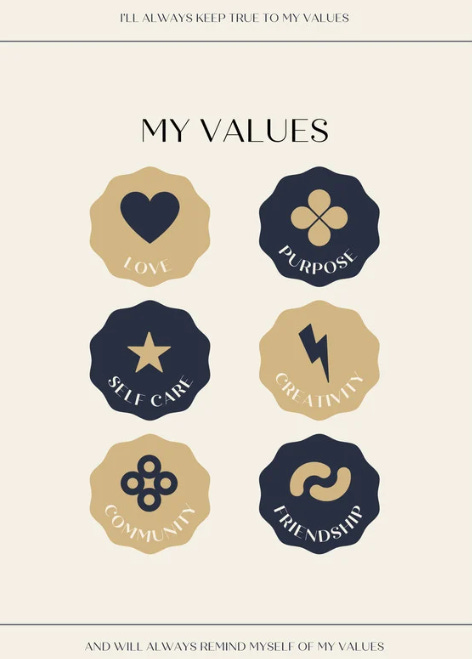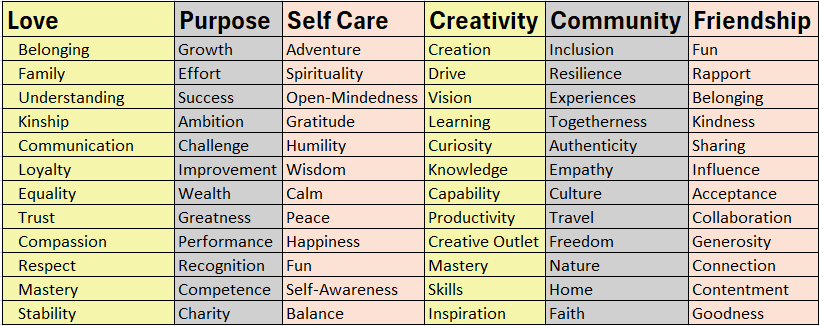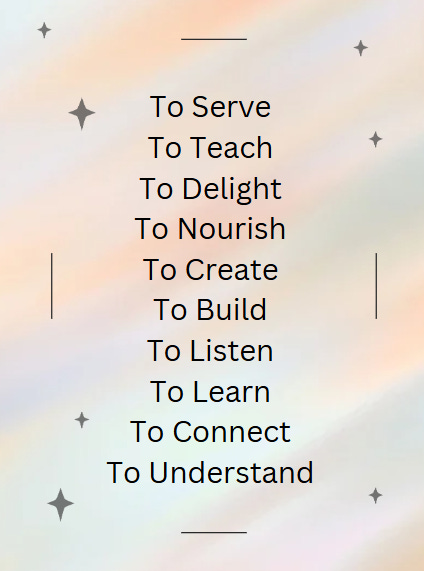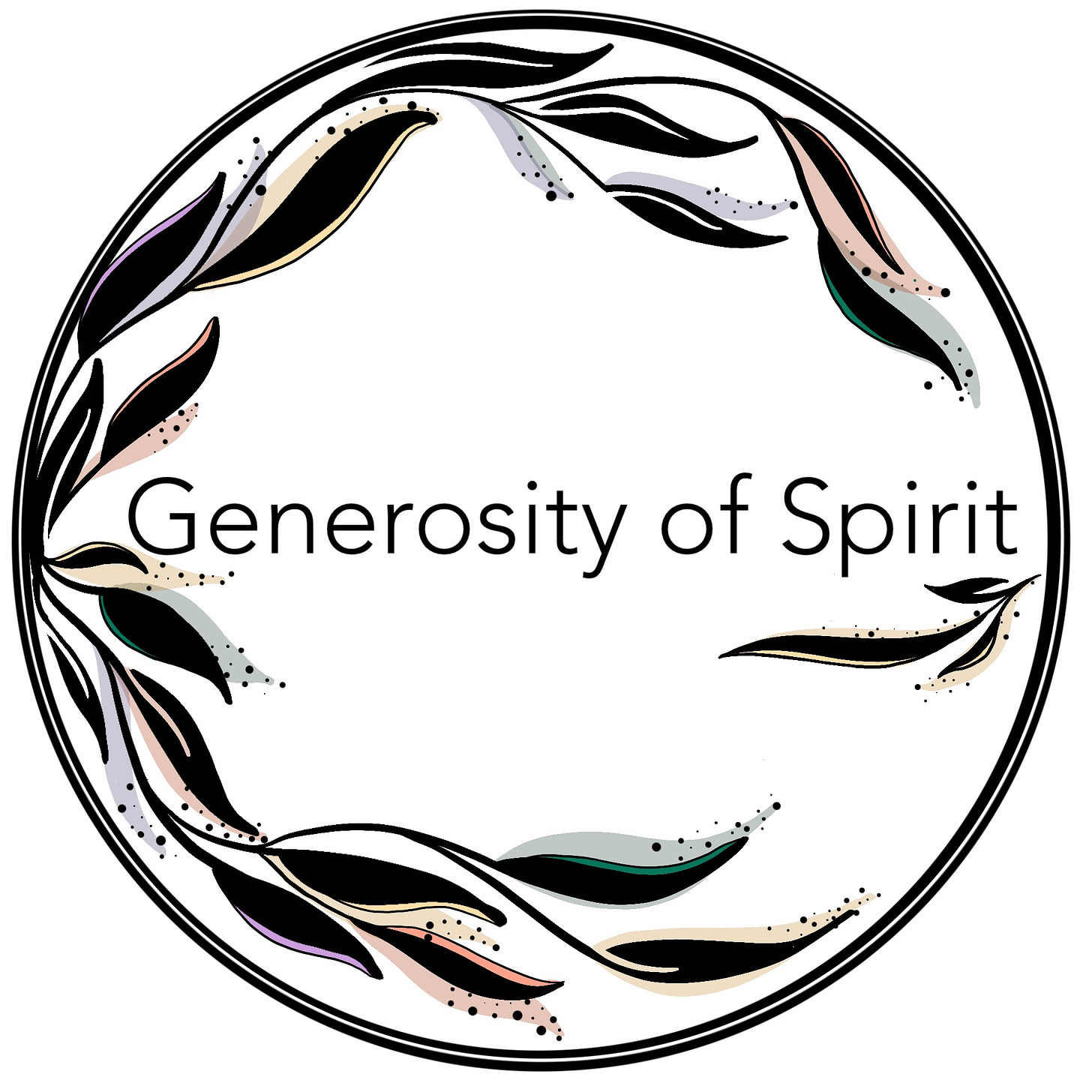Slow Living: Unveiling Your Values & Passions
"Knowing yourself is the beginning of all wisdom."–Aristotle.
This voiceover is an audio version of my Slow Sunday Letter below. It is unedited, so may have some stutters, imperfections, and background noise. I hope you enjoy listening to it anyway!
Welcome to Generosity of Spirit, a space to share my slow and gentle living philosophy, alongside my love of books and reading. Please do subscribe to join me on this gentle journey of discovery and receive my Slow Sunday Letter straight into your inbox.
Welcome back to another Slow Sunday Letter! I hope you have had a slow and gentle week.
How we define ourselves is so important to our overall happiness, inner peace and wellbeing. Our sense of self is comprised of many different elements, from many different sources. Our own sense of who we are, how others see us and how society views us. If we allow ourselves to be defined by outward sources, our identities can become fragile, and too closely aligned with what are essentially ‘labels’, without real substance. Your identity should originate from within, and should hold true no matter what ‘role’ or phase of life you find yourself in. Your identity or sense of self, will change and evolve over time and is very closely linked with your values and passions. Taking the time to understand yourself on this level will give you a deeper sense of knowing, confidence and peace. This is why, I believe doing this work and discovering your values and passions, and then returning to this practice often, provides a foundation on which slow and gentle living can thrive.
So, this week - grab a cuppa, get cosy and let’s see how the power of slow living is wrapped up in the unveiling of your values and passions…
Unveiling Your Values & Passions
‘when I discover who I am, I’ll be free’ Ralph Ellison
Spend a little time thinking about what you love to do, what makes you feel happy, fulfilled and at peace.
A useful way to do this is a ‘life appraisal’… literally collect data on your life from the last six months. Re-read journals, look at your photos, think about what you have read, movies/TV you have enjoyed or disliked, friends you have seen, think about work patterns and how you have spent your free time. Look at open tabs on your computer, posts you have saved to read later on social media, remind yourself of food you have eaten, how much sleep you have gotten. Anything and everything that comes to mind or stands out when looking back over the last six months, write it down.
Once you have collected all your data - write a list of your highs and lows. Can you see any patterns? For example, when I did this exercise, I noticed that a lot of my favourite moments of the last six months were when I was outside and in nature. I am a self-professed homebody, so this did surprise me. I love nature and really enjoy walking - but I'd never realised how important nature was to my wellbeing.
Noticing your own patterns may give you an indication of the moments or activities that have resonated more with you, and impacted your wellbeing in a more powerful way. For me, since doing this exercise, I have leaned into nature more. I have set myself a goal to start a nature journal this summer, I have planned longer walks, I’ve read more Nature Memoirs, I have suggested socialising outside with friends and family, and watched more nature documentaries.
Similarly, you may also notice patterns in your lows. When we take the time to think about, and examine the moments that have been difficult for us (sad, frustrating or even times we've been angry) we can reframe the memory, and give it the potential to become a learning moment.
The patterns will show you what could potentially be triggering you in a negative way, and maybe things in your life that need to be altered or changes you may need to make. For example, I noted how much time I had spent on my mobile by looking at my ‘screen time’ statistics in my phone settings. Seeing the average number of hours spent on my phone and how many times I opened specific apps, helped me re-focus on my continued ambition to limit phone/device time. I have tried to replace my phone with reading as often as possible, and made positive steps towards breaking my morning and evening ‘doom scrolling’. This intentional work has had a huge impact already in breaking my phone habit.
Once we have done our life appraisal, it’s time to dig in a little more, and think about our specific values and passions.
Below is a list to help inspire you, it is by no means exhaustive, but hopefully the list will serve as a spark of inspiration when you are thinking about your own values and passions.
Look at the list and write down a list of ten values that speak to you and your spirit. Once you have a list of ten, try and narrow them down further to just three values.
Once you have your three values - write them down everywhere - in your journal, in your diary, any where you will see them often. Now take the time to ponder your values. Let them speak to you, and show themselves in your life. If you need to change your top three - then do it. Let the right values speak to you at the right time, and start guiding you.
My Top Three Values right now - Peace, Kindness, Balance
The Definition of Ikigai
Ikigai (ee-key-guy)
Ikigai is an ancient Japanese philosophy dating back to the Heian period, between 794-1185. There is no direct translation into English, but it is a word that embodies the idea of happiness and finding your life’s purpose.
In the West the idea of ikigai has arguably been highjacked, and many of us have seen the popular Venn diagram with four interlocking circles representing – what you love, what you are good at, what the world needs and what you can be paid for.
The origins of ikigai frame the idea slightly differently, as it has nothing to do with income or earnings.
Ikigai is composed of two words: iki, which means life, and gai which describes value or worth. Gai comes from the word kai (“shell” in Japanese) which were deemed highly valuable, and from there ikigai was derived as a word that means value in living.
“Japanese people believe that the sum of small joys in everyday life results in a more fulfilling life as a whole” Mieko Kamiya
Do What You Love
I recently completed a course on Skillshare by Tim Tamashiro - Do What You Love - An Introduction To Ikigai, who talked about the difference between your job and your work. I had never heard anyone explain how I felt so well before.
“To learn about Ikigai, you must first learn all about yourself and one of the first things to learn is the difference between your job and your work. We tend to use the words job and work interchangeably these days, but … your job is totally separate from your work. What do I mean by that? Well, the dictionary definition of a job is a paid position of regular employment, so in other words, your job is something that pays the bills. It puts a roof over your head and food on your table. It provides you with security and status as well. A job is something that everybody needs in order to survive, and your job plays a very important role in your everyday needs. Work, on the other hand, is something entirely different. The definition of work is an activity involving mental or physical effort done in order to achieve a purpose or result, so in other words, you are your work, you exist for a purpose.” Tim Tamashiro
Discovering your ‘work’ is something you do to achieve a greater result, to find purpose or meaning for you. In this last year, my work has been focused on anything I could do that interested me or excited me, I started to explore what I was good at and what I loved. I said yes more, took my time to learn more, I discovered new hobbies, read more books, I opened myself up to the universe and explored as much as I could.
Ikigai encourages self-discovery and curiosity, and it evolves and changes over time with you. Taking the time to find what you love to do, what truly speaks to your soul, and then building upon that knowledge to explore how you can share it to the benefit of others is at the very heart of ikigai.
How To Discover Your Ikigai
So where do you start !?
To get started just focus on two things… What you love to do and what you are good at.
Have fun exploring this, give yourself plenty of time and enjoy the journey. Think about what truly effects your happiness, what speaks to your soul and gives you a sense of joy. Once you have discovered what you love to do and what you are good at, you are in a better position to allow your ikigai to come to light, and move into the forefront. This is a journey, and certainly won’t happen overnight, it is a lifestyle and a guiding philosophy.
Once you have a better understanding of these first two principles for yourself, it is time to move on to action.
Discovering your work is just part of the story because the other key tenet of the ikigai philosophy is sharing your work to the benefit of others. Ikigai is an action (a verb), so it is important to find the action that resonates the most with your spirit.
Name your Ikigai
“Ikigai is the action we take in pursuit of happiness” Mitsuhashi
Tim Tamashiro shows us how we can boil down the concept of ikigai to just two words in order to name our very own ikigai;
‘To (action word)’
This then becomes your anchor and driving force – focused on intention and action.
For example…
These are just some examples, but you can name your ikigai whatever you like- but bear in mind that your ikigai is an action. When you name your ikigai you’re naming it after an action that you love to do, and you are good at - so keep action words in mind.
The path to finding your ikigai is a deep, self-reflective journey, and it is different for everyone. It isn’t something you will arrive at and then instantly be content and happy. It is a life guiding philosophy that will develop throughout your life.
I have settled on ‘To Discover and Share’ – I found it so hard to choose just one word, so I had to choose a hybrid! It certainly helped when I was pondering my own ikigai that it evolves and changes over time. So, when thinking about my own action word, I was more focussed on what is speaking to me right now in my life.
This year I have been on a journey of discovery- a discovery of self and of learning about the world around me. I have always been a deep thinker, and when I graduated with a Philosophy degree, I thought maybe my learning was over. How wrong I was? I love to learn, and I am so curious about the world, people and life.
The more I discover the more I want to share. I named my first ever blog and website, Generosity of Spirit, because I wanted to share my journey with others.
Generosity of Spirit is the openness and willingness to share our ‘gifts’ , our ‘spirit’ (both emotional and material) freely with others
I love the concept of sharing – and this is a big reason I have enjoyed finding a new home on Substack so much. It feels like the perfect community to pour my heart and soul, to share my discovery of slow and gentle living and how it has benefited my life. My dear wish is that in sharing my experiences and discoveries, that it may help or inspire someone somewhere!
“Once you discover your ikigai, pursuing it and nurturing it every day will bring meaning to your life” García & Miralles
Now you know what you are good at, and you know what you love to do- and you have named your Ikigai. It is time to lean into it and let it guide you. A little bit of joy every day will add up, and when your ikigai takes centre stage a meaningful life starts to unfold around you.
Value & Passions: Journal Prompts
What delights you?
What do you never get tired of?
Describe the ways you nourish you mind, body and spirit?
What do people look to you for help with?
Think of a time in your life where you felt fulfilled, happy and powerful - what were you doing?
If you could teach the world one lesson, what would it be?
What do you feel confident doing?
What are you passionate about?
Who do you most admire?
If you had unlimited time and money - what would you do?
I really hope today’s Slow Sunday Letter has inspired you to start thinking about your own values and passions and your own ikigai. Devote some time in the coming week to think about what behaviours and activities you could do more of, what changes you could make to support your values and give them more space and power in your life. Have fun exploring what makes you, you.
Remember - this is your life and your story, and you are more in control of that story than you think.
I would love to know your thoughts and what you have named your Ikigai. If you feel able, please do share in the comments below.
Thank you for being here,
With Light & Love
Emily xxx
My content is completely free, but you can buy me a coffee following this link!
If you enjoyed this post, found it useful or want to help me spread the word about how enriching Slow & Gentle Living can be, please do like/leave a comment or share/restack to help others discover Generosity of Spirit. Thank you for reading!











This was grounding and inspiring at the same time. Thank you for the prompts! Immediately subscribed after reading.!
Some great prompts & ideas! Thinking both about what you love to do AND what you are good at is a clever way of discovering your purpose and passion! ⭐️